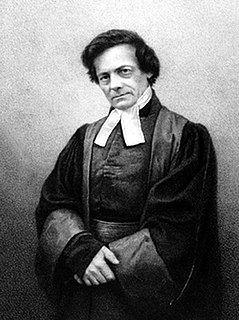A Quote by Robert Southey
It is not for man to rest in absolute contentment. He is born to hopes and aspirations as the sparks fly upward, unless he has brutalized his nature and quenched the spirit of immortality which is his portion.
Related Quotes
Man is more than his environment. It is from the innate quality of the Spirit in him, his inner storehouse, that he draws those ideas, his intuitions, which unify his perceptions of the external world instantaneously with a value which is qualitative and not quantitative, and which he embodies in the works of his culture - those achievements which belong not only to one particular time but to all times, and mark the path of his upward progress.
It is this one Spirit who makes it possible for an infant to be regenerated . . . when that infant is brought to baptism; and it is through this one Spirit that the infant so presented is reborn. For it is not written, 'Unless a man be born again by the will of his parents' or 'by the faith of those presenting him or ministering to him,' but, 'Unless a man be born again of water and the Holy Spirit.' The water, therefore, manifesting exteriorly the sacrament of grace, and the Spirit effecting interiorly the benefit of grace, both regenerate in one Christ that man who was generated in Adam.
Generally there is in man a divinity which strives to push him onward and upward. We believe that this power within him is the spirit that comes from God. Man lived before he came to this earth, and he is here now to strive to perfect the spirit within. At sometime in his life, every man is conscious of a desire to come in touch with the Infinite. His spirit reaches out for God. This sense of feeling is universal, and all men ought to be, in deepest truth, engaged in the same great work—the search for and the development of spiritual peace and freedom.
Modern man has been in search of a new language of form to satisfy new longings and aspirations - longings for mental appeasement, aspirations to unity, harmony, serenity - an end to his alienation from nature. All these arts of remote times or strange cultures either give or suggest to the modern artist forms which he can adapt to his needs, the elements of a new iconography.
Ought to have a universal compulsory force to move and arrange each part in the manner best suited to the whole. Just as nature gives each man an absolute power over all his members, the social compact gives the body politic an absolute power over all its members." "We grant that each person alienates, by the social compact, only that portion of his power, his goods, and liberty whose use is of consequence to the community; but we must also grant that only the sovereign is the judge of what is of consequence.
There is no portion of our time that is our time, and the rest God's; there is no portion of money that is our money, and the rest God's money. It is all His; He made it all, gives it all, and He has simply trusted it to us for His service. A servant has two purses, the master's and his own, but we have only one.
Whatever the situation may be, in the recollection of death there is reward and merit. For even the man engrossed in the world benefits from it by acquiring an aversion to this world, since it spoils his contentment and the fullness of his pleasure; and everything which spoils for man his pleasures and his appetites is one of the means of deliverance.
Just as a man cannot live in the flesh unless he is born in the flesh, even so a man cannot have the spiritual life of grace unless he is born again spiritually. This regeneration is effected by Baptism: "Unless a man is born again of water and the Holy Spirit, he cannot enter into the kingdom of God" (Jn 3:5)
But nature - that is, biological evolution - has not fitted man to any specific environment. On the contrary, ... he has a rather crude survival kit; and yet -this is the paradox of the human condition - one that fits him to all environments. Among the multitude of animals which scamper, fly, burrow and swim around us, man is the only one who is not locked into his environment. His imagination, his reason, his emotional subtlety and toughness, make it possible for him not to accept the environment but to change it.






































